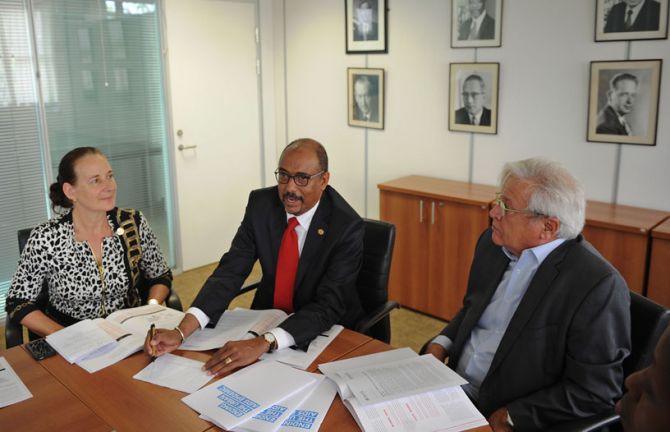

Press Release
UN-Habitat and UNAIDS call for renewed efforts to address HIV in urban areas
18 September 2015 18 September 2015NAIROBI/GENEVA, 18 September 2015—A new report by UN-Habitat and UNAIDS urges cities to do more to respond to HIV epidemics in urban areas. The report outlines that cities and urban areas are particularly affected by HIV, with the 200 cities most affected by the epidemic estimated to account for more than a quarter of all people living with HIV around the world.
The report, Ending the AIDS epidemic: the advantage of cities, was launched in Nairobi, Kenya, by the Executive Director of UN-Habitat, Joan Clos, and the Executive Director of UNAIDS, Michel Sidibé. It reveals that in many countries, rapidly growing cities are home to more than half of all people living with HIV and that many are facing challenges in ensuring access to HIV services.
“Although cities often have resources, viable health systems and the capacity for innovation and service delivery, they sometimes struggle to design and implement focused, effective and rights-based AIDS responses, often leaving behind the most vulnerable and marginalized populations,” said Mr Clos. “Cities are central to bringing a paradigm shift to the AIDS response—a concerted move towards shared responsibility between national and city authorities and community-based organizations in support of local leadership and local evidence to transform the social, political and economic determinants of HIV risk and vulnerability.”
The report highlights that city leaders have a unique opportunity to seize the dynamism, innovation and transformative force of the AIDS response to not only expand HIV services in cities but also address other urban challenges, including social exclusion, inequality and extreme poverty.
“Cities can lead change,” said Mr Sidibé. “As centres for innovation, cities can broker broad partnerships and use their vast resources to provide an inclusive, effective response to HIV based on evidence and grounded in human rights—to leave no one behind.”
In almost half (94) of the 200 cities most affected, HIV is transmitted mainly through unprotected heterosexual sex. In the remaining 106 cities, sex work, unprotected sex between men and injecting drug use are the main drivers of the epidemics. In the Asia–Pacific region, about 25% of all people living with HIV are estimated to reside in 31 major cities, while in western and central Europe, an estimated 60% of all people living with HIV reside in just 20 cities.
According to the new report, data from 30 countries that have conducted nationally representative household-based population surveys show that HIV prevalence among people 15–49 years old living in urban areas is higher than among those living in rural areas in most countries.
Even in countries that are still predominantly rural, cities are often home to disproportionate numbers of people living with HIV. For example, urban areas account for only 18% of Ethiopia’s population but for almost 60% of people living with HIV nationally.
The report outlines the need for cities to establish renewed efforts for an urban health approach that serves the evolving needs of cities and the people who live and work within them. It adds that these measures would help reach the UNAIDS Fast-Track Targets to end the AIDS epidemic as a global health threat by 2030.
The UNAIDS Fast-Track approach requires rapidly scaling up and focusing the implementation and delivery of proven, high-impact HIV prevention and treatment services: an approach that increasingly relies on urban leadership.
A number of countries have introduced specific legislation, national policies or strategies to respond to the needs of people living with and affected by HIV. However many countries continue to lag behind in allocating adequate resources and implementing inclusive and urban-friendly HIV programmes.
UNAIDS
The Joint United Nations Programme on HIV/AIDS (UNAIDS) leads and inspires the world to achieve its shared vision of zero new HIV infections, zero discrimination and zero AIDS-related deaths. UNAIDS unites the efforts of 11 UN organizations—UNHCR, UNICEF, WFP, UNDP, UNFPA, UNODC, UN Women, ILO, UNESCO, WHO and the World Bank—and works closely with global and national partners towards ending the AIDS epidemic by 2030 as part of the Sustainable Development Goals. Learn more at unaids.org and connect with us on Facebook, Twitter, Instagram and YouTube.
Contact
UN-Habitat NairobiTom Osanjo
tel. +254 722 631 599
Tom.Osanjo@unhabitat.org
UNAIDS Nairobi
Norha Restrepo-Lopez
tel. +41 79 447 3404
restrepolopezn@unaids.org
Press centre
Download the printable version (PDF)
